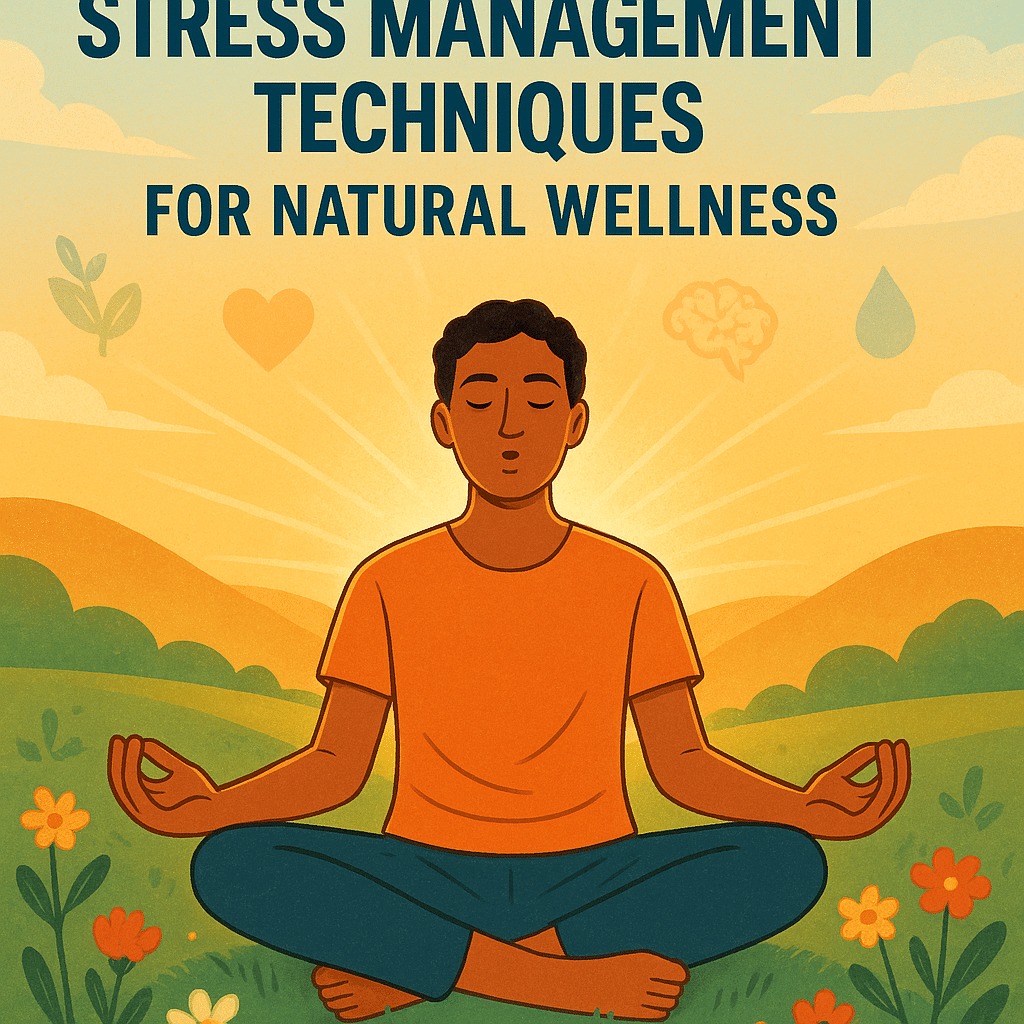Stress is an unavoidable part of life, yet how we manage it can make all the difference—especially for those of us who prioritize natural wellness. If you’re like me, constantly seeking natural stress management techniques that don’t rely on medication, this article is just what you need. I’m here to guide you through an array of powerful, science-backed stress management techniques that foster holistic balance—body, mind, and spirit alike. Together, we’ll explore effective stress relief methods at home, from deep breathing and mindfulness to nutrition and time management, enriched with herbal remedies and physical activity. Whether you’re dealing with daily stressors or chronic anxiety, the natural strategies I’ll share can help you find calm quickly and build resilience over time. So, if you want to embrace a healthier, calmer lifestyle tailored for health-conscious adults, read on—I promise this journey to natural wellness will be eye-opening and empowering.
Understanding Stress and Its Impact on Health
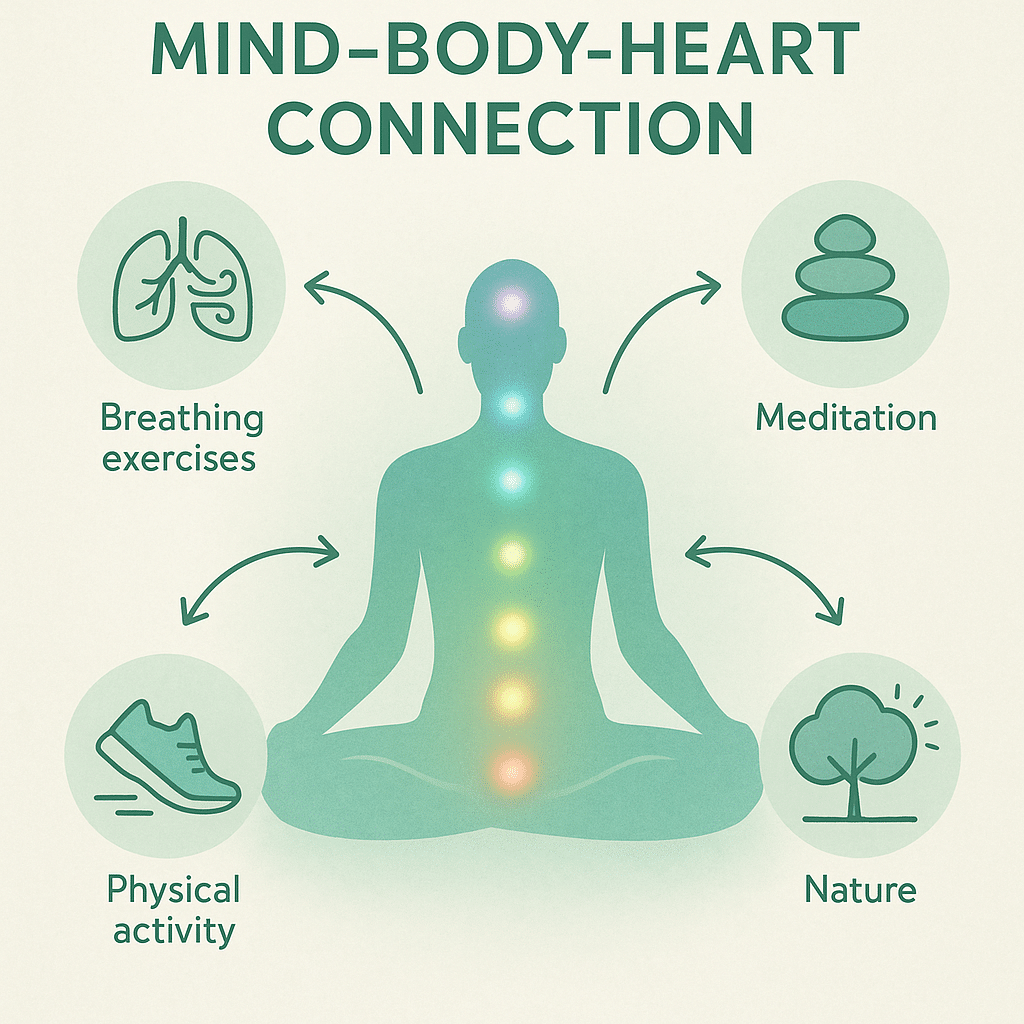
What Is Stress? A Natural Response Explained
Stress is essentially your body’s reaction to a perceived challenge or threat—a survival mechanism hardwired into human biology. When you encounter stress, your nervous system triggers the release of hormones like adrenaline and cortisol, putting you in “fight or flight” mode. This response boosts energy and alertness temporarily. However, stress isn’t inherently bad; it’s how your body gears up to tackle challenges. The problem arises when stress persists longer than necessary, turning into chronic stress—which can be a silent saboteur of well-being.
How Chronic Stress Affects Physical and Mental Wellness
Living with prolonged stress takes a heavy toll on your body and mind. Physically, it can lead to headaches, digestive issues, high blood pressure, and weakened immunity. Mentally, chronic stress increases the risk of anxiety, depression, and cognitive difficulties like memory lapses. Over time, high cortisol levels associated with constant stress can disrupt your sleep patterns, increase fat storage, and even accelerate aging. As a lifelong advocate of natural health, I’ve seen how unchecked stress quietly undermines wellness, making effective stress management techniques essential.
The Role of Cortisol and Stress Hormones in the Body
Cortisol, often called the “stress hormone,” plays a crucial role in regulating your metabolism, immune response, and blood sugar levels. When stress strikes, cortisol levels spike to help you deal with the immediate situation. However, when cortisol remains elevated for too long, it disturbs the balance of other hormones and bodily functions, contributing to weight gain, inflammation, and mood disorders. Learning natural ways to lower cortisol through lifestyle changes—including breathing exercises and quality sleep—can be a game-changer for those seeking lasting wellness.
The Foundations of Natural Stress Management
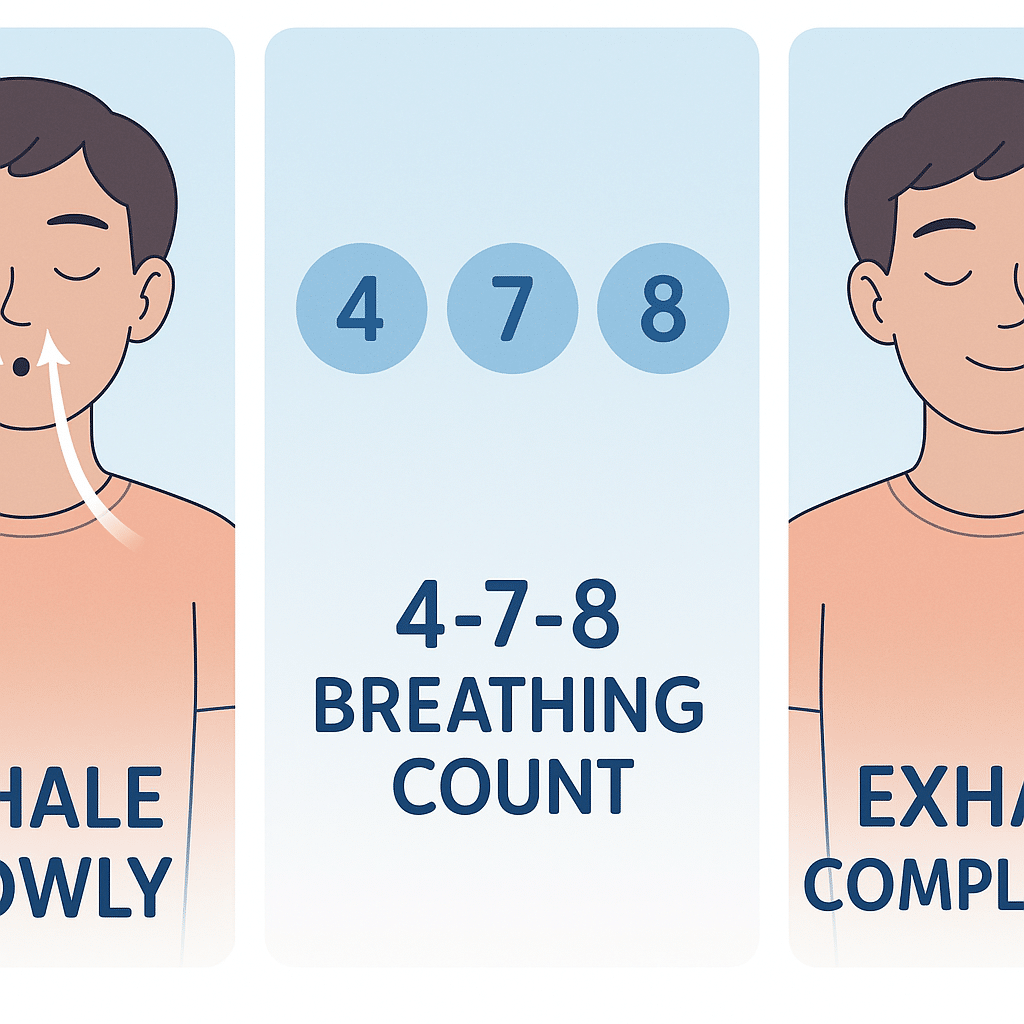
Importance of Holistic Approaches in Managing Stress Naturally
Natural stress management techniques emphasize treating the whole person rather than just symptoms. Holistic wellness blends physical, mental, emotional, and environmental strategies. By nurturing these interconnected systems, you support your body’s innate ability to self-regulate and bounce back from stress. This isn’t about quick fixes but developing sustainable habits that integrate with your daily life. Holistic approaches also respect your individuality—what works wonderfully for one person might differ for another, so tuning into your body’s signals is key.
Integrating Mind, Body, and Environment for Optimal Stress Relief
Stress is multifaceted, so managing it effectively requires syncing mind, body, and environment. Mindfulness and meditation promote mental clarity and emotional regulation, while physical activities like yoga ease tension in muscles and improve circulation. Nutrition fuels your brain and hormone balance, while a calm environment reduces sensory overload and supports relaxation. I’ve personally benefited from creating a stress management sanctuary at home—dim lighting, comfortable seating, some greenery, and calming scents—to amplify the effects of these techniques.
Effective Breathing Exercises for Stress Reduction
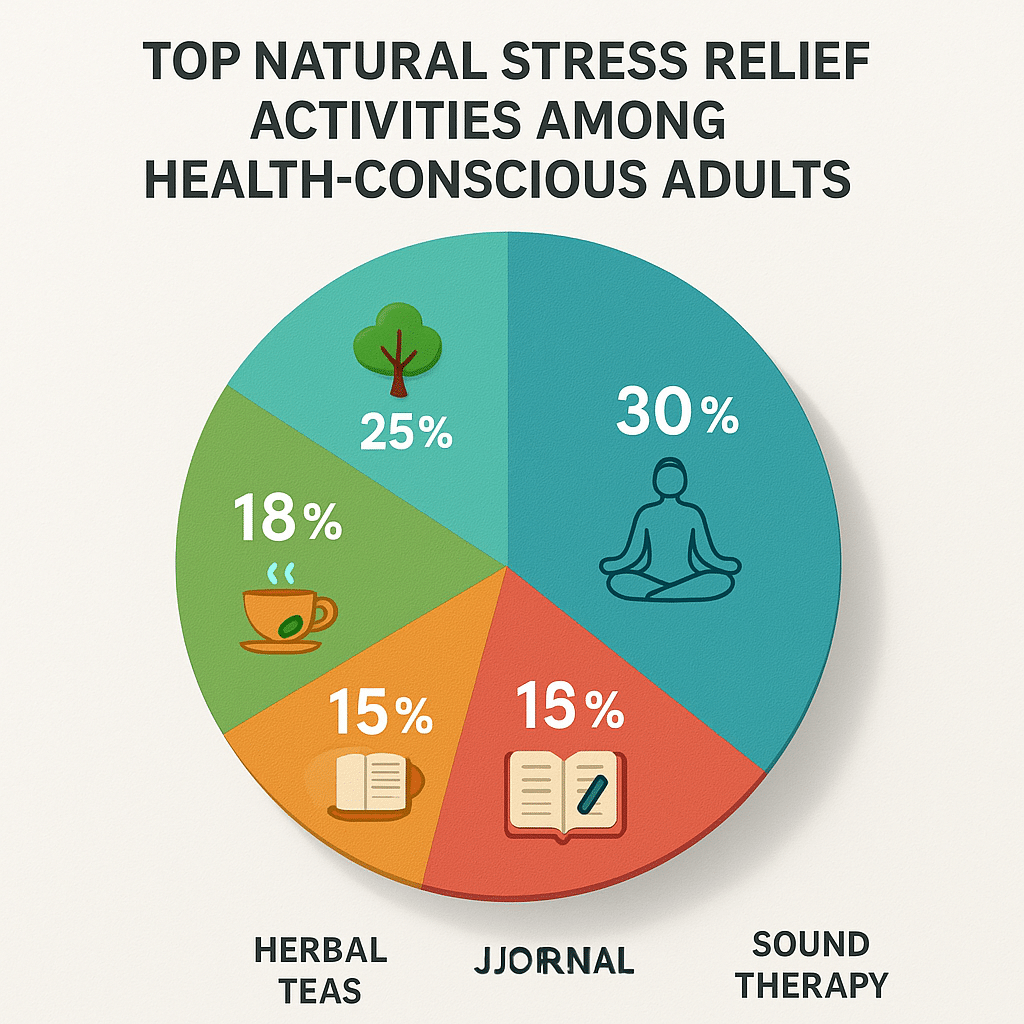
Deep Breathing Techniques to Activate the Relaxation Response
Deep breathing exercises are among the simplest yet most effective natural stress management techniques for adults. They stimulate the parasympathetic nervous system, responsible for calming your body. A popular method is diaphragmatic or abdominal breathing: breathe slowly in through your nose for a count of four, hold for seven, then exhale through your mouth for eight. This pattern, known as the 4-7-8 breathing technique, helps slow heart rate and lower cortisol. Doing this for five minutes daily can produce remarkable calming effects.
How Breath Focus Empowers Emotional Regulation
When stress strikes, many people unconsciously hold shallow breaths, which can exacerbate anxiety. Focusing on your breath serves as a mindfulness anchor, helping you stay present rather than spiraling into worries. This mindful breath awareness improves your emotional regulation, allowing you to respond thoughtfully rather than react impulsively to stressors. From my experience, coupling breath focus with affirmations or grounding techniques can further enhance this calming effect.
Mindfulness and Meditation Practices for Inner Calm
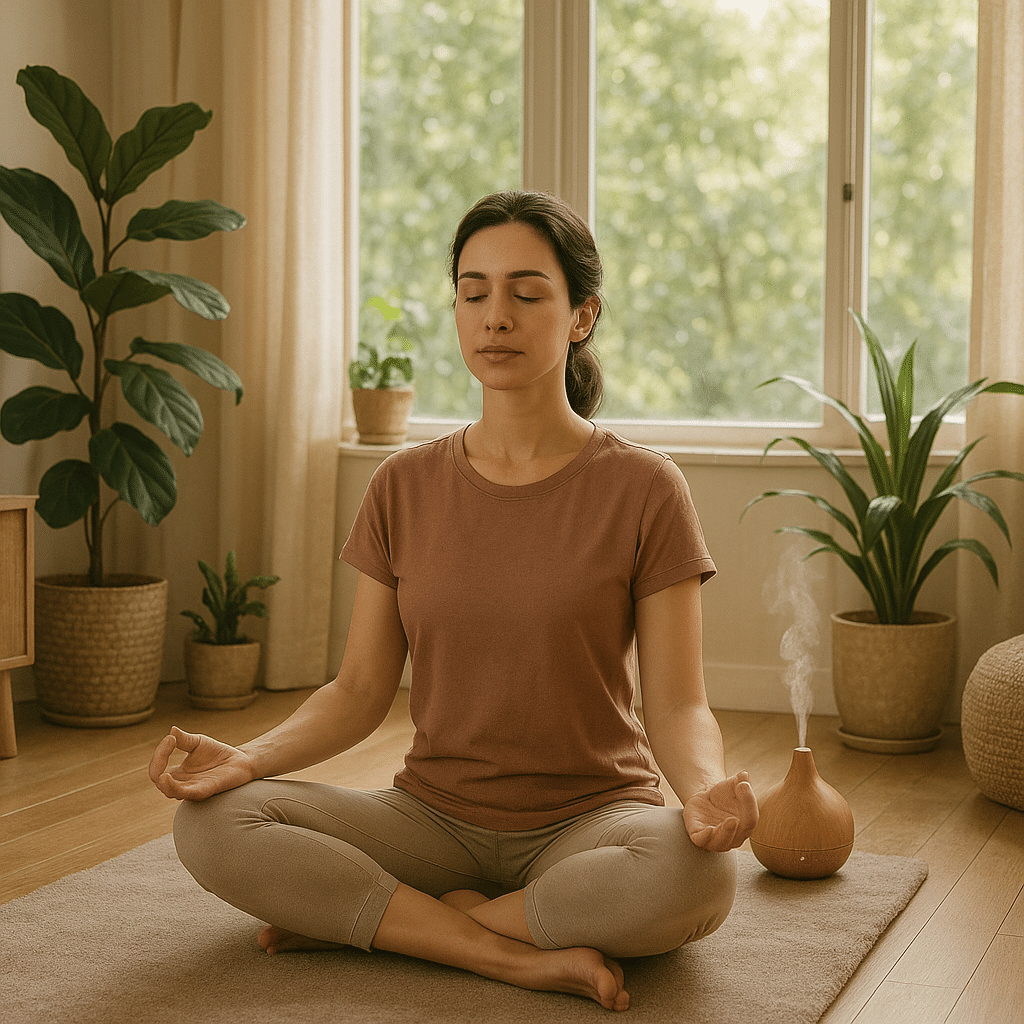
Beginner-Friendly Mindfulness Techniques for Daily Life
Mindfulness is simply paying full attention to the present moment without judgment. Starting with brief mindful pauses during the day—like savoring a cup of tea or noticing the sensation of walking—can reduce stress significantly. Apps like Headspace offer guided mindfulness tutorials that are perfect for beginners. Making mindfulness a daily habit eases the nervous system, improves focus, and increases emotional resilience.
Using Guided Imagery and Visualization for Stress Relief
Guided imagery invites you to visualize peaceful scenes or scenarios, triggering relaxation by engaging your imagination. Imagine yourself in a serene forest or on a beach, feeling calm and safe. I often use guided imagery during my evening routine, which naturally soothes my mind and helps with sleep. You can find free guided imagery exercises on platforms like Calm or through specialized YouTube channels.
Incorporating Meditation for Long-Term Anxiety Management
Regular meditation practice has profound impacts on brain function and stress hormones. Studies show consistent meditation reduces amygdala reactivity—the part of the brain responsible for fear responses—and lowers cortisol. Starting with short sessions (5-10 minutes) of simple breath or body scan meditations can build your endurance. I recommend establishing a dedicated quiet space and sticking to a routine—even a few minutes each morning can transform your stress levels over months.
Physical Activity: Yoga, Tai Chi, and Other Movement Therapies
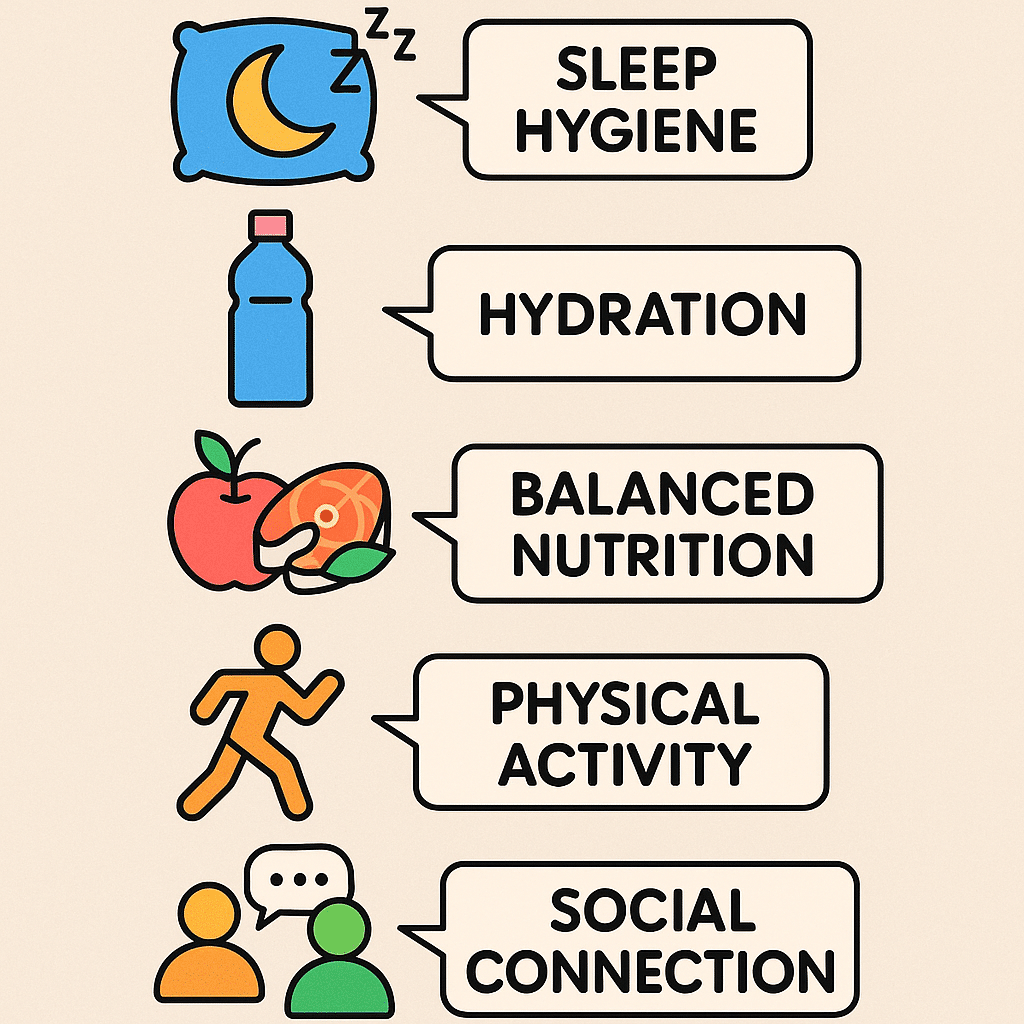
Yoga Poses for Reducing Stress and Releasing Tension
Yoga combines movement, breath, and mindfulness, making it a powerhouse stress management technique. Poses like Child’s Pose, Forward Fold, and Legs-Up-The-Wall have calming effects on the nervous system and ease muscle tightness. Practicing yoga regularly not only improves flexibility and strength but also helps regulate cortisol. I personally use Yoga with Adriene for beginner-friendly sessions focusing on stress relief.
Benefits of Tai Chi and Qigong in Balancing Mind and Body
Tai Chi and Qigong are gentle martial arts that emphasize flowing movements and breath control. These practices increase mindfulness, promote circulation, and foster emotional balance. Unlike vigorous workouts, they’re accessible to all fitness levels and perfect for calming a busy mind. Consistent practice lowers blood pressure and improves symptoms of anxiety. Many local community centers or online platforms offer classes tailored to all ages.
Making Outdoor Activities a Habit for Natural Mood Enhancement
Spending time in nature is a natural mood enhancer thanks to increased vitamin D, fresh air, and reduced noise pollution. Walking, hiking, or simply sitting in a green space lowers cortisol and improves serotonin production. I find that even 20 minutes in a city park lifts my spirits and grounds me instantly. Incorporating natural outdoor time into your routine complements other stress management techniques, creating a well-rounded approach to wellness.
Nutrition and Herbal Remedies to Support Stress Management
Foods That Help Lower Stress Hormones and Boost Mood
Nutrition plays a subtle but vital role in stress regulation. Foods rich in omega-3 fatty acids (like salmon and walnuts) reduce inflammation, while magnesium-packed foods (spinach, pumpkin seeds) support muscle relaxation and nerve function. Dark chocolate, berries, and green tea have antioxidants that aid brain health. Avoiding excessive caffeine and sugar also helps prevent cortisol spikes. I often prepare balanced meals rich in these nutrients to naturally regulate stress.
Herbal Supplements and Natural Remedies for Anxiety Relief
Herbs have been used for centuries in natural stress management techniques for adults. Valerian root, ashwagandha, passionflower, and chamomile are popular for their calming effects. Supplements like Gaia Herbs or Traditional Medicinals offer organic, carefully sourced options. Before trying supplements, consult your healthcare provider to ensure safety and proper dosages, especially if you take other medications.
Importance of Hydration and Balanced Nutrition for Wellness
Staying hydrated supports brain function and hormone balance, preventing mood swings and fatigue that stress often worsens. Eating regular, balanced meals stabilizes blood sugar, which helps keep irritability and anxiety at bay. I recommend aiming for at least 8 cups of water daily and making whole foods the foundation of your diet to empower your body’s natural stress defenses.
Quality Sleep: The Unsung Hero in Stress Management
Sleep Hygiene Tips to Improve Rest and Reduce Anxiety
Good sleep hygiene is key in natural stress management. Maintaining a consistent bedtime, reducing screen time before bed, and creating a cool, dark sleeping environment all improve sleep quality. Herbal teas like chamomile or blends from Celestial Seasonings can soothe your nervous system pre-bedtime. Avoiding heavy meals and stimulating activities close to bedtime also sets the stage for restorative sleep.
How Sleep Deficiency Exacerbates Stress and Ways to Improve It
Sleep deprivation amplifies cortisol and heightens stress response, creating a vicious cycle. Over time, poor sleep impairs concentration, emotional regulation, and immunity. To break this cycle, consider relaxation techniques before bed—breathwork, meditation, or gentle yoga. Consistent sleep routines improve not just your stress levels but overall wellness.
Time Management and Lifestyle Adjustments for Stress Control
Prioritizing Tasks and Setting Boundaries to Prevent Burnout
Effective time management reduces pressure and anxiety. Organizing your day by priority, breaking down large tasks, and learning to say no are invaluable skills. Burnout often occurs when boundaries blur between work and life. I keep a planner with realistic goals and schedule regular breaks to recharge—this simple step has profoundly decreased my stress.
The Role of Breaks, Hobbies, and Leisure in Maintaining Wellness
Incorporating enjoyable activities and intentional breaks prevents chronic stress accumulation. Hobbies that engage your creativity or bring joy, like gardening or crafting, increase happiness and relaxation. Leisure also provides needed mental rest. Whether it’s listening to music or spending time with loved ones, these moments are vital. Balance and joy keep stress manageable.
Building Social Support Networks for Emotional Resilience
Connecting with Others to Share Burdens and Improve Mental Health
Social connections provide a buffer against stress. Talking to friends, joining support groups, or engaging in community activities fosters a sense of belonging and reduces feelings of isolation. I’ve found that sharing struggles with like-minded, health-conscious adults strengthens resilience and motivation to keep up stress management efforts.
Positive Communication and Assertiveness in Stress Reduction
Expressing your needs clearly and respectfully prevents misunderstandings and tension, which are stress triggers. Assertiveness training is a natural stress management technique that empowers you to create healthier relationships and environments. Setting boundaries without guilt is freeing and enhances emotional well-being.
Creative Outlets and Expressive Therapies as Stress Relievers
The Power of Music, Art, and Journaling to Release Emotions
Creative expression channels difficult emotions and reduces mental clutter. Listening to or playing music, painting, or keeping a journal has therapeutic effects—helping clarify thoughts and soothe anxiety. For example, journaling daily gratitude or feelings can highlight progress and anchor you in positivity.
How Creative Practices Promote Mindfulness and Relaxation
Engaging in art or music requires mindfulness—the present moment focus that naturally calms the nervous system. Studies show that even passive music listening lowers blood pressure and cortisol. These creative outlets fit perfectly into a holistic strategy, especially for busy adults seeking natural stress relief activities without too much time commitment.
Emerging Natural Techniques: Emotional Freedom Technique (EFT) Tapping
How EFT Tapping Works to Reduce Stress Quickly and Naturally
EFT tapping involves gently tapping on specific meridian points on the body while focusing on stress or anxiety. This technique blends cognitive therapy and acupressure, and has gained popularity as an effective natural stress management technique without side effects. Research suggests EFT reduces cortisol levels and improves emotional balance after just a few sessions.
Incorporating EFT into Your Daily Stress Management Routine
EFT is easy to learn and can be practiced anywhere—whether at work or home. I start my mornings with a brief tapping session to clear any residual stress and set a calm tone for the day. Several apps like The Tapping Solution provide guided routines tailored to different stressors.
Unique Insight: Harnessing Nature’s Rhythms to Align Stress Management
Using Lunar and Circadian Rhythms to Enhance Relaxation Practices
Nature’s natural cycles—like the moon phases and daily circadian rhythms—impact our biological clocks and emotional states. Aligning stress management with these rhythms can deepen relaxation. For example, beginning new wellness habits during a new moon fosters fresh starts, while light exposure in the morning supports healthy cortisol rhythms.
The Science Behind Aligning Natural Cycles for Better Mental Wellness
Our bodies are finely attuned to environmental cues; disrupting natural cycles—through irregular sleep or exposure to artificial light—can increase stress and mood disorders. Integrating this knowledge, I’ve adjusted my routines to sync with daylight and darkness, improving sleep and stress levels markedly.
When to Seek Professional Support for Stress Management
Recognizing Signs That Need Expert Intervention
While natural stress management techniques work wonders, some situations require professional help—especially if stress results in persistent insomnia, severe anxiety, or depression. Recognizing when stress interferes with daily life is crucial to seeking timely intervention.
Integrating Natural Techniques with Professional Therapies
Many therapists now integrate holistic methods with conventional treatment, offering the best of both worlds. Natural practices can complement counseling or medication, easing symptoms and supporting long-term wellness. Never hesitate to discuss these options with your healthcare provider.
Creating a Personal Stress Management Plan for Lasting Wellness
Assessing Your Triggers, Preferences, and Lifestyle Factors
Creating a personalized plan begins with understanding your unique stressors and what natural stress management techniques resonate most with you. Journaling your emotional states and daily habits can reveal patterns needing attention.
Combining Techniques to Build a Tailored, Sustainable Routine
No single technique suffices; combining breathwork, mindfulness, movement, nutrition, and social support creates a balanced approach. For example, pairing morning meditation with afternoon yoga and evening journaling fosters continual stress regulation.
Tracking Progress and Adapting Your Plan Over Time
It’s important to monitor your stress levels and wellbeing over weeks and months. Adjust your routine as life circumstances change or new techniques capture your interest. Flexibility ensures your plan remains effective and invigorating.
Quick Takeaways
- Stress is a natural survival response but chronic stress can harm physical and mental health.
- Holistic natural stress management integrates mind, body, and environmental strategies.
- Deep breathing and mindfulness practices powerfully reduce stress hormone levels.
- Physical activities like yoga and Tai Chi calm nervous systems without strain.
- Nutrition and herbal supplements support emotional regulation and balance cortisol.
- Quality sleep and proper time management are foundational to long-term stress control.
- Social connections and creative expression boost emotional resilience and relaxation.
- Emerging methods like EFT tapping offer quick, natural relief for anxiety.
- Aligning with natural cycles enhances relaxation and mental wellness.
- Knowing when to seek professional help ensures comprehensive care for stress.
Frequently Asked Questions About Stress Management Techniques
1. What are the best natural stress management techniques for adults?
The best techniques combine mindfulness, deep breathing exercises, yoga, balanced nutrition, quality sleep, and social support. Each person’s needs vary, so trying different approaches and tailoring them to your lifestyle is essential.
2. How can I manage stress naturally without medication?
Natural stress relief methods at home include guided meditation, deep breathing, herbal supplements like ashwagandha, and gentle physical activity such as Tai Chi. Establishing good sleep hygiene and time management also play key roles.
3. Are there specific yoga poses for reducing stress and anxiety?
Yes, beginner-friendly poses like Child’s Pose, Cat-Cow, and Legs-Up-The-Wall help release tension and calm the mind. Combining these with breathwork and mindfulness maximizes stress reduction.
4. What nutrition tips support managing stress naturally?
Incorporate foods rich in omega-3s, magnesium, antioxidants, and maintain hydration. Avoid excessive caffeine and sugar. Herbal teas like chamomile and lemon balm can further ease anxiety.
5. How does guided imagery help with stress reduction?
Guided imagery uses visualization to transport your mind to calming scenes, which activates your relaxation response and reduces cortisol. It’s an accessible technique that improves emotional regulation and sleep quality.
Conclusion
Managing stress naturally is not just about avoiding discomfort—it’s about crafting a lifestyle that nurtures your whole being. From effective breathing exercises and mindfulness to balanced nutrition, restorative sleep, and supportive social connections, each stress management technique plays an important role. As a health-conscious adult, embracing these strategies empowers you to face life’s challenges with greater calm and resilience. Remember, the journey to natural wellness is personal and ongoing. Start small, stay consistent, and keep tuning into your body and mind’s needs. The confluence of holistic methods I’ve shared offers a robust toolkit for lasting tranquility and health. Don’t wait for stress to overwhelm you—take charge today by creating your personalized stress management plan. Your wellbeing deserves it!
I invite you to explore these stress management techniques and see which natural strategies resonate most with your lifestyle. Visit trusted resources like Gaia Herbs, Headspace, and Yoga with Adriene to start your journey. Here’s to a calmer, more balanced you!

